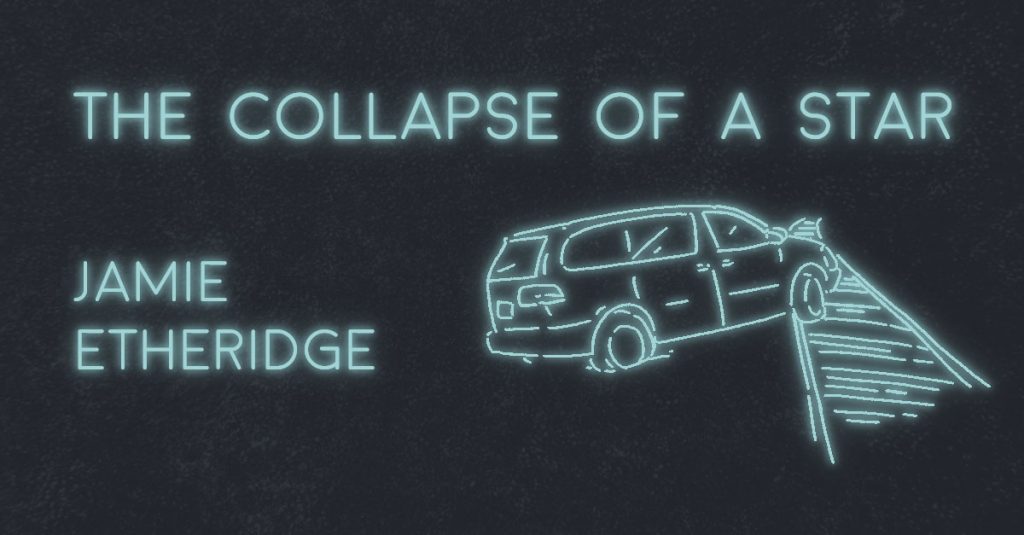
THE COLLAPSE OF A STAR by Jamie Etheridge
We sit in the van parked on the railroad tracks not knowing if the train is coming, or if you are going. You want to die. You said so and we believe you. Momma cries out, “Bill, please,” over and over and we wait, inhale then hold, for you to decide.
It was always like that. Random moments of drama; life or death, on the side of the road. That time in Texas in the middle of the worst blizzard in thirty years. The truck’s engine exploded and we were stuck, freezing, as semis whooshed past on the highway and the truck rocked in the aftertow. ‘Bill, please,” she pleaded as the baby cried in her lap and we huddled in the back of the cab, fingers crackling in the cold.
The FBI mailed out wanted posters. Later, when I finally got the files: thick black lines redacting my childhood alongside the names of the agents who’d tracked you. I found facsimiles of your face, eyes front, turned to the left, turned to the right, and your aliases, pages and pages of them. You were always a good storyteller, a natural whipsaw with a lie.
There were pills and booze and cons. And days when you could hardly get out of the bed in whatever cheap motel and whatever cheap town we’d drifted to, and Momma had to scratch out breakfast, lunch and dinner for us on the $10 she had hidden in her wallet.
There were joys. You driving us through the looming hush of the redwoods of northern California, explaining how the dinosaurs scratched their bellies against the Cretaceous bark. Or the sound of your cowboy boots crunching on the gravel as we followed you to the edge of a cliff in the Cherokee National Forest, your smile wide as the vista over the valley below.
The melancholy of Willie Nelson singing about angels flying too close and your voice, melodic and on key, despondent as a star in an empty universe.
I can still smell the smoke from your Winston King trailing out the open window as we children slept folded against each other like paper bags. The infinite hours, days, weeks, months and years we cruised I-10, each mile bringing us closer to, or taking us further away from, what you couldn’t face.
Then the time in Vegas when you disappeared for two or maybe three days, I can’t remember. We ate cereal and milk and watched endless episodes of Knight Rider and Three’s Company on the small, staticky TV in the motel room. We knew you’d come back. We hoped you’d come back rich or at least with enough money to buy food.
You almost died in Arkansas.
Why do they call it that? I always think of the ark of the Covenant and the followers of Moses. Here are some rules to follow: Never tell anyone your real name (I didn’t know mine until I was nine years old.) Help your mother take care of the little ones. Always stay close in case we have to leave in a hurry. Don’t sass your father or you’ll get a slap. One day when I’m gone, you’ll be sorry.
I’m sorry, Daddy.
The heart attack came on so swiftly that your face turned blue with the pain, and your eyes, already bulging, bugged out and scared us all. The nitroglycerin pills weren’t working and Momma called the ambulance and they took forever to come. Seven children left behind in the motel room, too terrified to talk, hungry and squabbling over the television because at least that was something we could control. They airlifted you to Tulsa and Momma said there would be an operation. They would slit open your heart, chip away at the blockages the way miners dig for gold.
But in the night you stripped the IV from your arm, ripped out the catheter, painting the ICU floor and walls with your blood until they called security and Momma, and she flew to the hospital with your clothes and boots. We woke up in the morning with you in the bed, in the motel room, smoking, your skin like drain water after a fierce storm. We knew nothing and yet understood that everything, everything, was wrong.
You said you dreamed you would die on that table, an open heart at 5am and so you kept it closed. The doctor yelled after you that you wouldn’t live to see tomorrow. 365 tomorrows are what you got instead.
After that you wouldn’t leave the South but circled in a meandering loop between Florida, Georgia and Alabama, between your parents, her parents and other relatives. Life being relative, we knew by then. We stayed close to ‘home’ in case something happened.
Only you were our home, the blazing, burning sun of our universe and when you collapsed finally, sinking in upon yourself, the morphine dimming the light in your eyes, the doctor shaking his head slowly from the doorway, our world went dark. And like planets long orbiting a dying star, we were freed to float away, off into the silent, empty universe, or to collapse ourselves into the hole at the center of the world.
